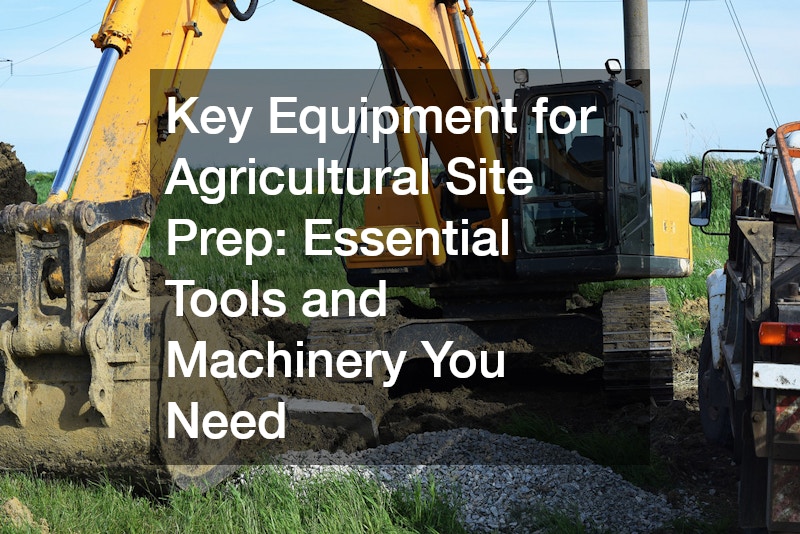Agricultural development is crucial for ensuring food security and sustainable farming practices across the globe. As the farming industry evolves, it becomes increasingly important to understand the various tools, machinery, and methods that enhance productivity and efficiency. This article will explore key equipment for agricultural site preparation, effective resource management, and the importance of professional installation services in the agricultural sector.
Key Equipment for Agricultural Site Prep: Essential Tools and Machinery You Need

In any agricultural development initiative, the right tools and machinery are fundamental for effective site preparation. Essential equipment includes tractors, plows, and tillers, which facilitate soil manipulation and crop preparation. Investing in a reliable kubota backhoe for sale can significantly ease excavation and grading tasks.
Moreover, the use of advanced technology such as GPS-guided tractor sales are transforming site prep processes by enhancing accuracy and reducing labor costs. As farmers seek to utilize their land more efficiently, these technologies prove invaluable, particularly in the face of climate change and resource scarcity. Hence, staying informed about the latest innovations in agricultural tools can ultimately lead to improved outcomes in food production.
In addition to mechanized tools, farmers must ensure that their equipment is maintained and calibrated to meet specific agricultural development needs. Regular maintenance checks not only extend the life of machinery but also prevent unexpected breakdowns during critical farming periods. This emphasizes the importance of proper training and hiring skilled personnel capable of utilizing these tools effectively.
Renting Concrete Tools: Cost-Effective Solutions for Agricultural Development Projects

Concrete plays a vital role in various agricultural development projects, from constructing storage facilities to laying down durable surfaces for machinery. Renting concrete tools provides a flexible, cost-effective solution, especially for farmers who may not require these tools regularly. By opting for concrete tool rental, farmers can take on larger projects without the burden of owning expensive equipment.
Furthermore, utilizing rental services allows for access to the latest machinery, ensuring job completion with the best available technology. This is especially important when executing tasks such as pouring foundations for metal carports or installing silos, where precision is key. As agricultural development projects grow in complexity, such strategic tool utilization becomes increasingly valuable.
In conclusion, renting concrete tools not only conserves financial resources but also invites experts into the process. Partnering with skilled operators during these projects can enhance quality and decrease the chances of errors. This collaborative approach ultimately leads to more successful and efficient agricultural development projects.
Why On-Site Fuel Storage Is Crucial for Agricultural Infrastructure
For effective agricultural development, proper management of fuel is essential to ensure uninterrupted operations. On-site fuel storage minimizes downtime caused by trips to fuel stations and provides easier access to necessary resources. For operations utilizing local propane tanks, incorporating them onsite ensures that equipment remains functional during peak operational hours.
Additionally, having fuel storage facilities can result in significant cost savings as farmers can purchase fuel in bulk. This practice not only provides a buffer against fluctuating fuel prices but also safeguards equipment against performance issues associated with poor fuel quality. Factors such as climate control within fuel tanks and regular inspections contribute to reliable fuel availability and operational efficiency.
Moreover, local regulations must be adhered to in order to maintain safety standards surrounding fuel storage. Proper installation and maintenance of fuel systems help mitigate risks associated with leaks and spills. This ensures that agricultural development is pursued responsively, preserving both resources and the environment.
Choosing a Reliable Contractor for Agricultural Building Roof Installations

The selection of a reliable contractor is critical for roofing installations in agricultural buildings. Given the unique challenges such as weather resistance and the specific structural needs of agricultural shelters, hiring an experienced roofing company is essential. A trustworthy contractor not only guarantees quality workmanship but also ensures adherence to safety protocols and regulations.
Moreover, the choice of roofing materials can greatly impact the longevity and effectiveness of a facility. Durable options such as metal or shingles designed for heavy weather conditions tend to provide excellent protection against the elements. By collaborating with a qualified roofing expert, farmers can explore suitable materials that align with their budget and agricultural development goals.
After installation, maintaining the roof is vital to prevent costly renovations and ensure longevity. Regular inspections, proper drainage systems, and repairs when needed are fundamental practices for preserving roofs. In this way, choosing the right contractor helps secure the integrity of building infrastructure within agricultural development.
Protecting Your Farm with Durable Metal Structures for Equipment and Storage
Durable metal structures such as barns and equipment sheds are prevalent in agricultural development due to their resilience and longevity. These structures are designed to withstand harsh weather conditions while providing ample space for equipment and supplies. Implementing metal carports or storage facilities can increase the lifespan of valuable farming tools and machinery significantly.
Additionally, metal buildings are often more cost-effective in the long run due to lower maintenance requirements and energy-efficient options. Investing in high-quality materials reduces the need for frequent repairs and can even offer advantages in insurance costs. Farmers can redirect saved funds towards other essential areas of agricultural development, like innovation or technological advancements.
In summary, the use of metal structures ensures optimal protection for equipment and enhances operational efficiency. Security features such as reinforced doors or surveillance can be combined with robust designs. Protecting assets effectively allows for smoother agricultural operations, making resilient structures a beneficial choice for long-term development.
Restoring and Maintaining Equipment with Professional Surface Preparation Services
Surface preparation services are critical for the restoration and maintenance of agricultural equipment. Techniques such as sandblasting services are utilized to clean metal components effectively, ensuring durable finishes and preventing corrosion. Such professional services are indispensable in extending the lifespan of farming machinery, contributing to agricultural development efforts.
Moreover, surface preparation improves the adhesion of coatings and paint, enhancing not only the appearance of equipment but also its protection against the elements. Regular maintenance using these services can ultimately lead to better performance as equipment operates more efficiently. This ensures that the investment made in machinery yields good returns by reducing the need for constant replacements or repairs.
Farmers can benefit greatly from integrating a schedule of surface preparation into their operational practices. By adopting routine cleaning and restoration cycles, they can preemptively address potential issues. This proactive approach translates to reduced downtime and increased productivity, establishing a solid foundation for future agricultural development.
Setting Up Waste Management: Proper Installation for Agricultural Septic Systems
Agricultural septic systems play an important role in waste management for farming operations. Proper installation ensures that waste is disposed of in a manner that is safe for the environment and compliant with regulations. Enlisting professional assistance for septic installs guarantees adherence to local codes and standards, preventing potential fines and environmental hazards.
Furthermore, a well-engineered septic system contributes to overall agricultural development by preventing contamination of water sources. Strong waste management practices play a significant role in maintaining soil health and ensuring that surrounding ecosystems remain intact. This is critical for sustaining a balanced agricultural ecosystem and fostering long-term agricultural productivity.
Regular maintenance of septic systems further enhances efficiency and longevity. Farmers should adopt precautionary measures such as annual inspections to catch issues early on. Proper waste management practices thus ensure that agricultural development can thrive sustainably and efficiently.
Ensuring a Reliable Water Supply with Expert Well Pump Repairs
Reliable water supply is vital for effective agricultural operations, and well pump systems are central to this need. Expert well pump repairs minimize downtime and safeguard consistent access to groundwater resources. Agricultural development relies heavily on such systems to maintain irrigation and livestock care, making timely repairs essential.
Screening well pump professionals to ensure they have the necessary expertise and tools can streamline repair processes. Issues such as low pressure or complete system failure directly impact productivity, making it crucial to act quickly when problems arise. Regular maintenance checks can also prevent costly breakdowns and promote system longevity.
Investing in high-quality well pump systems and repair services provides farmers peace of mind, knowing their water supply will not falter. Knowledgeable technicians can offer insights into system upgrades that improve efficiency. In this way, maintaining a reliable water supply becomes a cornerstone of successful agricultural development.
The Importance of Fuel Systems for Efficient Agricultural Operations
Efficient fuel systems contribute significantly to the smooth functioning of agricultural operations. As fuel is a critical resource for machinery, having a well-planned fuel system directly enhances overall productivity. Farmers can achieve higher operational efficiency by integrating local propane tanks for machinery fueling and heating purposes.
Implementing strategic fuel management practices ensures farmers can operate their equipment at optimal levels, leading to reduced costs and increased output. Economically, the ability to purchase propane in bulk lowers expenses, benefiting long-term business plans. Ensuring that fuel systems are regularly maintained lays a foundation for reliable agricultural development.
Lastly, understanding the specifics of different fuel types (e.g., propane versus diesel) helps farmers make informed decisions regarding their operations. Incorporating eco-friendly options can also enhance a farm’s sustainability profile while catering to consumer demand for greener practices. Focusing on effective fuel systems aligns with the overarching goals of agricultural development.
Must-Have Machinery for Agricultural Site Work: Investing in Reliable Backhoes
When it comes to agricultural site work, reliable backhoes are invaluable. These versatile machines facilitate tasks such as digging, lifting, and grading, making them essential for various construction and maintenance duties. By investing in a kubota backhoe for sale, farmers can enhance their site work capabilities significantly.
Moreover, the adaptability of backhoes allows for their use in different agricultural settings, be it land clearing for crops or establishing wells. Owning such machinery leads to improved project turnaround times, thereby expanding productivity. A reliable backhoe becomes an indispensable asset in efforts to drive agricultural development forward.
Regular maintenance and training for users further maximize the investment in backhoe machinery. Ensuring that operators are well-versed in the capabilities and best practices promotes safety and efficiency during site work. Thus, investing in this must-have machinery sets the pathway for successful agricultural development projects.
How Tool Rentals Can Save You Time and Money on Agricultural Construction Projects

Tool rentals offer an effective way to save both time and resources in agricultural construction projects. Instead of investing capital into expensive machinery that may only be used sporadically, farmers can rent tools tailored to specific project needs. This flexibility allows for efficient project management without unnecessary financial strain.
Furthermore, rental services often provide access to the latest technology and equipment that might otherwise be unaffordable. Farmers can thus leverage advanced tools like excavators and concrete mixers while adhering to a limited budget. This need-based approach enhances overall efficiency and enables timely project completions, which are vital for successful agricultural development.
Additionally, renting from local suppliers fosters community relationships and supports local economies. Many rental services provide maintenance and support, ensuring that tools remain in good condition during the rental period. The combination of well-maintained equipment and strategic planning leads to streamlined operations, showcasing the viability of tool rentals for agricultural projects.
Building Strong Foundations: Roofing Solutions for Agricultural Sheds and Barns
Strong foundations are necessary for the longevity and durability of agricultural buildings, such as sheds and barns. A reliable roofing solution protects valuable assets from weather elements and enhances the overall operational efficiency of a farm. Experts should be consulted to establish appropriate roofing materials and structures that meet specific agricultural development needs.
Metal roofs, for instance, provide excellent durability, reduced maintenance needs, and energy efficiency, making them ideal for agricultural settings. The right roofing also contributes to insulation and temperature regulation within buildings, benefiting livestock and stored products. A proper roofing installation combined with attention to detail during construction plays a pivotal role in long-lasting agricultural infrastructure.
In addition, understanding regulations and codes when it comes to agricultural construction is paramount. Hiring a professional roofing company can ensure compliance with local building laws and best practices. Investing time and resources in strong foundations ultimately leads to successful agricultural development for multiple years to come.
Maintaining Agricultural Equipment: The Benefits of Professional Cleaning and Repairs
Maintaining agricultural equipment through professional cleaning and repairs is vital for optimal performance. Over time, equipment can accumulate dirt and grime, potentially affecting functionality and safety. Engaging professional services ensures that machinery is regularly cleaned and serviced, extending its operational life.
Cleansing agricultural equipment also allows for thorough inspections that can uncover potential issues before they escalate. Early detection of wear and tear can save farmers significant costs in extensive repairs or replacements. Prioritizing regular equipment maintenance enhances overall agricultural operations, promoting forward momentum in development efforts.
Furthermore, a well-maintained fleet contributes to the efficiency and efficacy of agricultural practices. Clean and efficient machines ensure timely planting and harvesting, directly impacting yields and profitability. Integration of professional cleaning and repair services strengthens the backbone of agricultural development, setting the stage for future advancements.
In conclusion, the path towards successful agricultural development is multifaceted and involves careful planning regarding equipment, resources, and professional services. By prioritizing investments in durable structures and high-quality machinery, farmers can enhance their productivity and sustainability. Each aspect discussed in this article, from renting tools to maintaining equipment, contributes to the broader goals of advancing agricultural practices and ensuring food security for generations to come.

